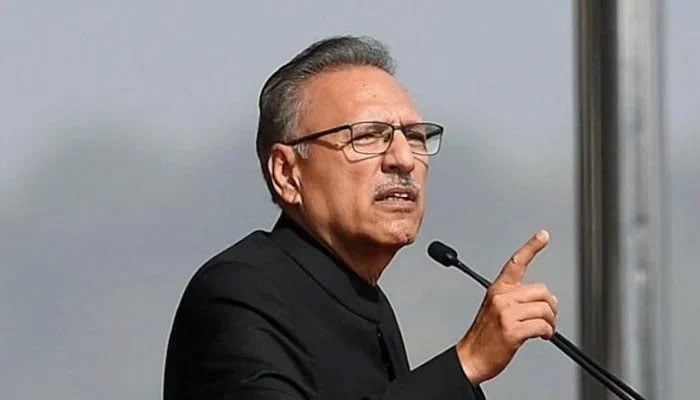President Alvi urges CJP to form commission on regime change conspiracy in Pakistan
President Alvi urges SC’s top judge to form judicial commission, chaired preferably by CJP himself, to conduct open hearings
ISLAMABAD: President Dr Arif Alvi on Thursday penned a letter to Chief Justice of Pakistan Umar Ata Bandial, pleading with him to form a judicial commission to probe the regime change conspiracy in the country.
In his letter, President Alvi urged the SC’s top judge to form a judicial commission, chaired preferably by the CJP himself, to conduct open hearings and thoroughly probe the allegations of regime change conspiracy to avert the political and economic crisis in the country and keep the political powder keg from igniting.
“The Judicial Commission should conduct an in-depth and thorough investigation into what may or may not have been planning and preparation, starting before or following the overt threat, in the form of a possible conspiracy for regime change in Pakistan,” read a statement issued by the president’s secretariat.
Underlining the importance of constituting the commission, he said that a serious political crisis was looming in the country and major polarisation was taking place in politics, in the wake of recent events, as well as among the people of Pakistan.
The president emphasised that it was the collective duty of all institutions to make utmost efforts to avert damaging consequences to the country and prevent further deterioration.
‘Political powder keg may ignite at any time'
President Alvi regretted the fact that random comments were being quoted out of context, misunderstandings were increasing, opportunities were being lost, confusion prevailed, and with the economy also in crisis, the situation on the ground was approaching a political powder keg that may ignite at any time.
The Supreme Court, in the past, had taken initiatives to constitute judicial commissions in matters of national security, integrity, sovereignty and public interest, he added.
He further stated that there seemed to be a political consensus in the country as, according to press reports, the Prime Minister had also expressed a desire for establishing a commission.
President Alvi said that the nation held the SC in high regard and expected it to meet its expectations, adding that the commission should investigate the matter based not on technicalities of law but in the real spirit of justice.
'People deserve clarity'
President Alvi said that it, undoubtedly, would be a great service to our country, as the people of Pakistan deserved clarity on such a matter of national importance.
The president said that in world history there existed myriad examples of regime change operations through conspiracies which were later confirmed by the declassification of top-secret documents. He lamented that it happened much later after the destinies of these countries had been significantly damaged by these illegal interventions.
“Who knows better than your honour that to prove, that a “smoking gun” has been identified in the hand of a conspirator, or to find a possible money trail, or to identify meetings where people have been motivated towards cover action, or where people have been bought and sold, could be a vigorous exercise”, the president added.
“I am of the strong opinion that even recorded circumstantial evidence can lead the way towards some conclusions, based not on technicalities of law but in the real spirit of ‘justice’”, read the statement issued by the president’s secretariat.
He regretted that in Pakistani history, people had alleged and strongly believed in many obvious but unfortunately unproven conspiracies such as the murder of the 1st PM of Pakistan Shaheed Liaquat Ali Khan, the Agartala Conspiracy case, PM Zulfiqar Ali Bhutto’s public waving of a letter and allegation of a conspiracy against him, President Ziaul Haq’s plane crash, Abbottabad incident, and many other matters that remained inconclusive.
-
Security forces gun down 30 terrorists in multiple IBOs in KP: ISPR
-
MQM-P calls for new province in Sindh
-
US report validates Pakistan military edge over India: PM
-
Banned TTP poses serious threat to Pakistan security: UNSC panel
-
CM Afridi clarifies remarks on by-poll after ECP requests army deployment
-
Dubai sees 3.2m Pakistani passengers in 2025 as airport sets new milestone
-
Security forces kill 23 Indian proxy terrorists in KP's Kurram
-
Pakistan to construct island to boost oil exploration: report












